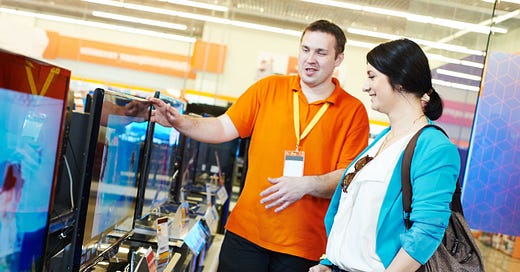Digital Buying Helpers.
When companies want to sell their products, they advertise. What if a consumer who wants to buy a product does the same? Will companies flock to them and try to sell their wares? Well, soon they will.
Imagine this - Part 1:
You want to buy a camera. You says into your phone, "Hey Siri, I want to buy a camera. What do you recommend?"
Immediately, Siri creates an AI helper for you.
The AI helper creates a list of questions to ask you.
You reply to your AI helper, helping it understand your requirements.
Your AI helper will surf the internet and seek out information from various cameras.
It also reaches out to your friends.
Then, it creates a website specifically for you.
In this site, various players will add information using their corporate AI bots.
Google/Bing will create a microsite,
Camera companies like Sony/Nikon will create one, etc.
A section on information with product reviews and comparisons.
A camera company site may also have some public visuals (untouched/unedited) that were clicked by that camera.
A section on basics:
For a camera site, it will discuss photography, digital, films, focus, aperture, etc.
Offers for you
Various shops, department stores, e-stores, and companies will offer specific services to you.
There will be a social feature indicating who among your friends owns which camera and how they feel about it. You can also send them questions about shops and models.
Camera companies can embed a flash program to allow users a simulated learning experience. This is also true for other products, such as phone A/Cs, washing machines, etc.
A well-known camera expert could have some auto-suggestions for your profile.
Reverse Wikipedia
Think of the site as a reverse Wikipedia created for just one reader. This makes sense because a photography company or a camera company can spend time or money curating the resources, whereas a single user cannot do so without intruding on his schedule. This information, collected by different vendors, is then pooled into a single place created for the user. This allows prospective sellers to market to precisely that one person. However, since this information is ranked as per the relevance of the user by knowing his web surfing habits, his web contacts and things they like to search and access, it will be completely customized.
Reengineered forums
If you visit a forum, one common comment you get on many posts is that someone has already shared this or solved this previously, and you should search within past posts. If only searching through past posts were that easy! Wouldn't it be easier if the forum found out what was already said and entered it as comments in my post?
Curator lounge
Alternatively, the site can be hosted by a curator. Thus, a person who deals in wine can answer the questions once, and the site's back end can mine these answers while creating a solution specific to the customer.
This is permission marketing 2.0!
Traditional marketing, Seth Godin calls it interruption marketing, was designed to interrupt your work and bombard you with things they want to sell. Permission marketing, a Seth Godin innovation, changed this when companies sought to find out what you wanted and then try to sell it to you. What I have described is, in reality, a digitally enabled permission marketing customized for the user based on his/her habit and profile.
All this is possible using AI bots
This brings me to NVIDIA's recent announcement at CES 2025. Jensen Huang of NVIDIA talked about new chips and computational abilities that enable the availability of cloud-based, network-based, and device-based AI. These pervasive AI capabilities will create many such opportunities.
The future is definitely exciting!





